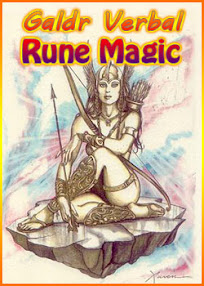Anonymous - Galdr Verbal Rune Magic (196.0 Kb)
 Book downloads: 2270
Book downloads: 2270
Galdr or Galdor, from the Old Norse, originally meant 'incantation'. The verb "gala" is also used for "to crow". It later came to mean magic in general. These are the sounds used in runic oral spells.The Galdr sounds are from Edred Thorsson's Futhark, a Handbook of Rune Magic.This rune provides success, advancement in career, a turnabout in luck for those in difficulty. The good luck it provides is not permanent, but a single event or a short period of good fortune. After that the charm must be renewed, not only magically bu... More >>>Book can be downloaded.
Note that, unfortunately, not all my books can be downloaded due to the restrictions of copyright. However, most of the books on this site do not have copyright restrictions. If you find any copyright violation, please contact me at  . I am very attentive to the issue of copyright and try to avoid any violations, but on the other hand to help all fans of magic to get access to information.
. I am very attentive to the issue of copyright and try to avoid any violations, but on the other hand to help all fans of magic to get access to information.
If you are having difficulty downloading books, or you are looking for a book that is not on the site (but maybe it is in my home library), please write me a email to

and I will try to help, I can send the book by e-mail
darkbooks.org began in early 2008 I am happy to donate my time to providing you this resource, I would also like to note, that, although I try, I do not always have enough time to deal with the site, including, unfortunately, I do not always have time to answer all letters, because I have to earn money for a living. If you can financially help me, it would free me from the worries of earning money for living, perhaps partially, but ideally completely, then all 100% of my time could be devoted to the site. Also I do pay monthly web server/files storage and hosting costs to keep this site on the air. Please consider making a donation to help me continue this activity and devote more time to it or at least offset the cost of paying for storage/hosting. Even a small contribution helps!
Galdr or Galdor, from the Old Norse, originally meant 'incantation'. The verb "gala" is also used for "to crow". It later came to mean magic in general. These are the sounds used in runic oral spells.The Galdr sounds are from Edred Thorsson's Futhark, a Handbook of Rune Magic.
This rune provides success, advancement in career, a turnabout in luck for those in difficulty. The good luck it provides is not permanent, but a single event or a short period of good fortune. After that the charm must be renewed, not only magically but through an act of binding or connection in the social sense. This act can be a gift to charity, help to another, or some other action to like oneself to a social order. This rune is good for areas of money, friendliness, and gaining merit. Fehu is a sign of hope and plenty, success and happiness, but also the responsibilities of those at the top and a social binding at all levels. Cooper, Esoteric Rune Magic.
It is the power of generation at its most basic level. Its energies are totally wild and very useful for magick involving swift, radical changes. To hasten affairs to their next stag use after the "subject " rune in your runescript. To increase monetary wealth. Protection of valuables. The "sending" rune use it to send either your energy or the enrgy of the runes out into the formative spheres. Peschel, A Practical Guide to the Runes.
About Author:
"Anonymous" of course means "without a name" and is used when the author is not known--or sometimes, when a story develops out of an oral tradition over generations with possibly many storytellers contributing to and revising the tale before it is finally written down and becomes literature.
A notable amount of ancient and medieval literature is anonymous. This is not only due to the lack of documents from a period, but also due to an interpretation of the author's role that differs considerably from the romantic interpretation of the term in use today. Ancient and Medieval authors were often overawed by the classical writers and the Church Fathers and tended to re-tell and embellish stories they had heard or read rather than invent new stories. And even when they did, they often claimed to be handing down something from an auctor instead. From this point of view, the names of the individual authors seemed much less important, and therefore many important works were never attributed to any specific person.



 Book downloads: 2270
Book downloads: 2270
 . I am very attentive to the issue of copyright and try to avoid any violations, but on the other hand to help all fans of magic to get access to information.
. I am very attentive to the issue of copyright and try to avoid any violations, but on the other hand to help all fans of magic to get access to information.
 and I will try to help, I can send the book by e-mail
and I will try to help, I can send the book by e-mail